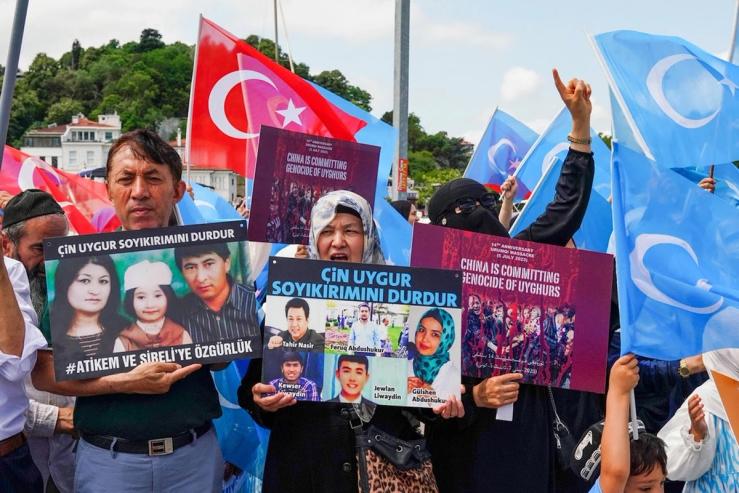The News
Turkish authorities said they detained six people accused of spying on Uyghur communities on behalf of China’s intelligence agency, while a seventh suspect remains wanted by police. The incident threatens to raise tensions between Ankara and Beijing over the minority ethnic group.
Turkey is home to more than 50,000 Muslim Uyghurs — a group with strong linguistic and cultural ties to Turkey — and thousands have fled there from China’s western Xinjiang region in recent years to escape repressive treatment by Beijing. China has sent large swaths of the Uyghur population to internment camps, actions U.S. officials have said amount to a genocide.
While China’s treatment of Uyghurs has long been a source of contention between Ankara and Beijing, the two countries’ deepening economic ties have led the growing Uyghur diaspora in Turkey to fear for its safety.
The espionage incident could pose a risk to Turkey’s attempt “to position itself as a hub in the Chinese trade corridor project aiming to link Asia and Europe,” Al-Monitor reported.
SIGNALS
As Erdoğan flip-flopped on Uyghurs, China hit back with criticisms of Turkey’s treatment of Kurds
Turkish President Recep Tayyip Erdoğan has changed his rhetoric on Uyghurs several times. The country has historically been seen as a safe haven for Uyghur refugees, although many activists question whether Ankara is committed to upholding that status. In 2009 while serving as prime minister, Erdoğan accused China of committing “genocide” against the Uyghurs. But Ankara later refused to join international condemnation of China’s detainment camps in Xinjiang due to a “growing need for Chinese investment at a time when Western capital is fleeing Turkish markets,” The Diplomat reported in 2020. Last year, however, Ankara acknowledged that Beijing’s relentless crackdown on Uyghurs has created a rift between Turkey and China, and the Turkish government has refused to extradite Uyghur dissidents back to China. In response, Beijing has become increasingly critical of Turkish foreign policy towards its own main ethnic minority, the Kurds, the Baku Research Institute reported,“joining global condemnation” of Turkey’s military incursion into a Kurdish region of northeast Syria and Iraq in 2021.
Beijing has allegedly intimidated Uyghur diaspora dissidents into spying
A 2020 investigation by Coda Media detailed how Chinese security officials asked Uyghurs living in Istanbul to attend Uyghur events and relay information on certain individuals back to Beijing or risk the safety of their family members living back in Xinjiang. Experts said these intimidation tactics undermine trust in activist Uyghur groups and could dampen efforts aimed at rebuilding ethnic communities abroad. The suspicion among diaspora Uyghurs “frays [the community’s] social fabric,” one researcher told Radio Free Asia.
Turkey’s position as a link between the West and Asia helped turn it into an espionage hotspot
As both a geographical bridge between east and west and a hub for political dissent, Turkey — particularly Istanbul — has become a prime espionage target in a region of the world “filled with geopolitical intrigue, vindictive autocrats and organized crime,” journalist Nicholas Morgan wrote for Ahval, a Turkish opposition newspaper. The spy arrests are not the first espionage incident to emerge in Turkey this year: Authorities in January detained more than 30 people suspected of spying for Mossad, Israel’s national intelligence agency. Turkey’s security reputation was also tarnished by the assassination of Saudi journalist Jamal Khashoggi in the Saudi consulate in Istanbul, as well as by the kidnapping of Iranian critic Habib Chaab, who was abducted by Iranian agents in Turkey in 2020. While Turkey’s own intelligence services are more than capable of hunting down assassins and spies within its borders, “larger considerations supersede any need to do so,” Morgan wrote, arguing that Ankara’s priorities are to maintain stable international relations rather than make a “big fuss” over issues involving foreign politics.



